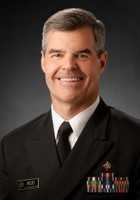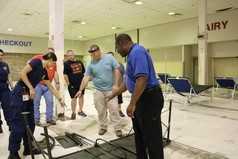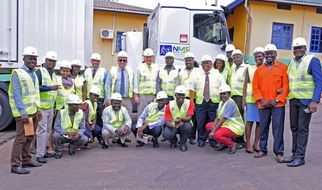Updates From The Stockpile: June 2017

The stockpile supports state, local, tribal, and territorial public health emergency responders and strives to ensure needed resources are available and ready to deliver to the right place at the right time. Learn More.
Leadership Spotlight: RADM Stephen C. Redd
A leader in emergency response and recovery

RADM Stephen C. Redd, M.D., is director of the Office of Public Health Preparedness and Response (OPHPR), Centers for Disease Control and Prevention (CDC). In his current role, Dr. Redd leads CDC’s public health preparedness and response activities. His center is responsible for state and local readiness, the regulation of select agents and toxins, emergency operations, and managing the nation’s stockpile of emergency medical countermeasures.
Preparing State and Local Responders

CDC helps prepare state, local, tribal, and territorial responders to respond effectively during an emergency when stockpile items are deployed. This preparation is accomplished by providing extensive training, technical assistance opportunities, and guidance to these partners on how to receive and distribute products from the stockpile and on developing and exercising their preparedness plans.
Stockpile experts prepare public health workers to respond during a public health emergency. Learn more.
Stockpile Experts Offer Global Support To Improve Supply Chain Management in Public Health Emergencies
A public health crisis can strain medical supply chains—or break them entirely. Through GHSA, health ministries in partner nations can now receive preparedness support. Find out how.

Around the world, many countries have developed medical supply chains that work well for meeting everyday health needs. However, these systems may not handle the sudden, large influx of medical supplies, equipment, and pharmaceuticals needed during a large-scale public health emergency. Through CDC’s participation in the Global Health Security Agenda (GHSA), the Strategic National Stockpile (SNS) works with partner nations to enhance medical supply chain logistics for public health emergencies.
To help partner nations ready their supply chain logistics, SNS can
- assess the ability of existing medical supply chains to manage a large influx of medical material,
- train staff to create plans for increasing medical supply chain capacity during a large-scale public health crisis, and
- provide follow-up technical assistance to test and finalize those plans.
The Benefits

The concept of meeting medical material requirements to protect a nation’s people in a crisis is called medical countermeasure (MCM) logistics. An MCM logistics plan will help partner nations create a quickly expanding medical supply chain to receive, stage, distribute, and manage large amounts of domestic or donated medical material during public health emergencies.
Stockpile experts can help countries develop an MCM logistics plan to complement broader all-hazards public health response planning and identify resources needed to execute the plan.
In 2016, SNS hosted workshops in developing countries including Ethiopia, Uganda, and Cameroon. These workshops enhanced host nations’ abilities to detect and respond to public health threats within their borders and manage medicines and supplies in a large-scale public health emergency.
The Process
SNS has a four-phase program to support MCM logistics planning:
Phase 1 – SNS experts visit a country for 3-4 days to gather data and information on the country’s medical supply chain and to meet key staff. This information is used to create an MCM supply chain workshop and to improve technical assistance.
Phase 2 – SNS conducts a 4-day MCM supply chain workshop in-country to cover general medical supply chain operations and logistics planning. By the end of the workshop, participants will have a timeline to create an MCM plan and an idea of who should be on the planning team.
Phase 3 – Planners and advisors work with host country planners and logistics staff to create an MCM plan. This step is done remotely via email and conference calls. Planners write drafts based on a template provided by on-site SNS staff, who will also provide comments and guidance on drafts until both sides agree that the plan is appropriate and workable.
Phase 4 – SNS experts return to host country and work with planners to conduct a short workshop to validate the plan and show any gaps authorities need to address.
For more than 17 years, SNS experts have helped domestic partners plan MCM operations. Its facilitators and advisors are recognized for their diligence and expertise.

Learn more about how partner nations can receive this service. Contact snsquestions@cdc.gov.

Frequently Asked Questions
When Does CDC Release Medicines and Supplies from the Strategic National Stockpile?
Medicines and supplies held in the stockpile can be deployed with or without a federal emergency or federal disaster declaration. They are generally provided upon request by state or territorial public health officials responding to major public health incidents. However, the federal government may direct CDC to deploy emergency medical countermeasures from the stockpile prior to receiving a state’s request or prior to a federal emergency or disaster declaration, public health emergency, or an important event. The Department of Health and Human Services’ Assistant Secretary for Preparedness and Response may direct CDC to deploy medicines and supplies under any of the following scenarios:
- If a credible threat exists or a catastrophic incident or attack is imminent, the stockpile may be deployed. This federal decision to deploy can occur during certain incidents or threats, such as an infectious disease outbreak or in anticipation of a major storm or natural hazard.
- A state or territory makes a request for assistance if a potential or actual situation is identified that may exceed state, territory, tribal and/or local capabilities.
- When the health of an individual is at risk, CDC may deploy medicines based on a hospital clinician’s request. This type of request is generally for those products that have limited or no commercial availability but are maintained in the stockpile for emergencies.
The federal government also may direct CDC to deploy stockpile products in support of national security special events or to respond to isolated or small-scale incidents that require specific medical countermeasures for which the stockpile is the only source.

Content source: Division of Strategic National Stockpile
Strategic National Stockpile is a division of the Office of Public Health Preparedness and Response.
- Page last reviewed: October 5, 2017
- Page last updated: October 5, 2017
- Content source:


 ShareCompartir
ShareCompartir